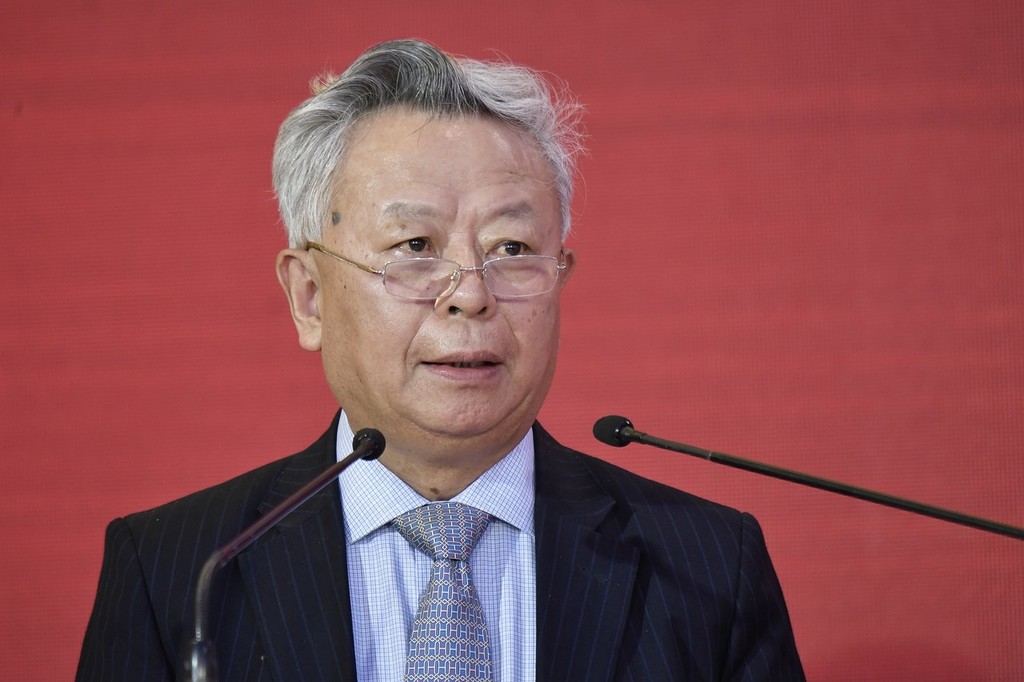AIIB head becoming influential in world of finance
By ZHAO HUANXIN | China Daily | Updated: 2019-04-20 03:55

Jin Liqun, president of the Asian Infrastructure Investment Bank, is far from being a household name in China, yet he is arguably one of the better known Chinese in Washington.
David Malpass, the new president of the World Bank, referred to him simply as "Mr. Jin" in his first, brief news conference last week in Washington, and The New York Times identified him "a banker inspired by Western novelists" who is seeking to build Asia.
A Shakespearian scholar and former vice-minister of China's Finance Ministry, Jin has led the newest multilateral development bank to expand its membership from 57 to 93 in three years, financed projects with other such banks to the tune of billions of dollars, and won top marks from leading rating agencies.
The 69-year-old said the AIIB looks to continue its close partnership with the World Bank and other lenders and strike a balance between the increasing expectations placed on his bank and the AIIB's mission, while never straying from the path of operating as a "lean, clean and green" organization.
In an interview in Boston on the sidelines of the annual Harvard College China Forum last week, Jin was back to being the scholar he was decades ago, expressing his appreciation for US writers who had helped him understand the country and its history better.
Among his favorites are Nathaniel Hawthorne, Mark Twain and Theodore Dreiser, though William Faulkner stuck with him the most.
"I read the Nobel laureate's Go Down, Moses many times because if you don't read it carefully, you simply don't know what he is talking about," Jin said. He also had read Absalom, Absalom! at least three times.
"This has really inspired me with an increased sensibility toward human relationships, and humans' relationship with nature," he said. "I think a liberal arts education is very much important for character building, for it teaches you how to value human life, relationships, mutual trust and how you should behave in relating to others."
While Jin may not have directly translated what he read into the culture and core values of the AIIB, he has steered the institution to navigate along the lines of being environmentally friendly and caring for communities where it invests.
"This bank should be lean, clean and green. That means a bank with a core group of professional staff that stays busy and a nonresident board of directors, which are not corrupt and care about the environment," said Jin, who once chaired the supervisory board of China Investment Corp, the country's sovereign wealth fund.
To meet AIIB standards for quality, projects must be financially viable and eco-friendly, and equally important, embraced by local communities, he added.
"By working with all the other founding members, we've managed to set up a bank with a new governance structure, and a new modus operandi, yet the same standards of environmental and social safeguards," Jin said. "It's a process of credibility and trust enhancement."
Within 18 months of inauguration, the AIIB received triple-A ratings from the three leading credit rating agencies — Moody's, Standard and Poor's, and Fitch — in 2017. The top rating was confirmed in 2018.
Jin warned his staff that a triple-A rating is not the same as receiving a doctoral degree. "A PhD, once conferred, stays with you for the rest of your life. A triple-A rating does not," he said. "It will be taken away as soon as you no longer deserve it."
Asked about the AIIB's relations with nonmembers, Jin said the bank remains open and inclusive, with a policy of universal recruitment and international competitive bidding.
The bank has US professionals in important positions and business relations with US banks, such as Bank of New York Mellon, which provides dollar-clearing services, and other nonbanking financial institutions.
"Indeed, Ms Natalie Lichtenstein, an American legal expert with years of experience at the World Bank, served as the chief counsel for drafting the Articles of Agreement, and was the bank's first general counsel," Jin said, adding that the bank also has a few Japanese professionals, and he encourages more Japanese to apply for jobs at the AIIB.
Jin talked in glowing terms about cooperation with the World Bank as the AIIB's biggest partner. These two development banks have co-financed a number of projects over the past three years.
He added that his first meeting with Malpass last week did not touch on specific investment programs, but their exchange of information and ideas went "very well", with lots of issues clarified.
Malpass, former United States undersecretary of the Treasury, began his five-year term in early April. He was chosen by US President Donald Trump in early February as the candidate for the World Bank presidency, following the abrupt resignation of former World Bank chief Jim Yong Kim.
"I think President Malpass is very serious about leading the World Bank in promoting poverty reduction, environmental protection, climate change mitigation and, in particular, cooperation with our bank," he said.
Asia cannot expect to sustain itself without being connected with the rest of the world, Jin said. That's why AIIB cannot ignore its non-Asian members.
The best way to achieve that purpose is to have close working relationships with all the multilateral lenders and bilateral donors, such as the World Bank, the European Bank for Reconstruction and Development, Asian Development Bank, Inter-American Development Bank, African Development Bank and Islamic Development Bank, he said.
"Each and every institution has its limitations, no matter how much capital it has," Jin said. "We may not have programs as ambitious as a lot of people would expect, but we will do meaningful work and try to play as big a role as possible by leveraging our resources and working with other institutions."
























